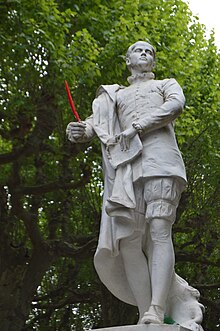Étienne de La Boétie
You can help expand this article with text translated from the corresponding article in French. (December 2013) Click [show] for important translation instructions.
|
Étienne de La Boétie | |
|---|---|
 | |
| Born | 1 November 1530 |
| Died | 18 August 1563 (aged 32) |
| Education | |
| Era | Renaissance philosophy
|
| Region | Western philosophy |
| School | |
Main interests | Voluntary servitude |
| French and Francophone literature |
|---|
| by category |
| History |
| Movements |
| Writers |
| Countries and regions |
|
| Portals |
Étienne or Estienne de La Boétie (French: [etjɛn də la bɔesi] ⓘ, also [bwati] or [bɔeti];[1] Occitan: Esteve de La Boetiá; 1 November 1530 – 18 August 1563) was a French magistrate, classicist, writer, poet and political theorist, best remembered for his intense and intimate friendship with essayist Michel de Montaigne.[2][3] His early political treatise Discourse on Voluntary Servitude was posthumously adopted by the Huguenot movement and is sometimes seen as an early influence on modern anti-statist, utopian and civil disobedience thought.[2][4]
Life
La Boétie was born in
Writings
La Boétie's writings include a few
To him, the great mystery of politics was obedience to rulers. Why in the world do people agree to be looted and otherwise oppressed by government overlords? It is not just fear, Boetie explains in the Discourse on Voluntary Servitude, for our consent is required. And that consent can be non-violently withdrawn.[5]
It was once thought following Montaigne's claims that La Boétie wrote the essay in 1549 at the age of eighteen, but recent authorities argue that it is "likely that the Discourse was written in 1552 or 1553, at the age of twenty-two, while La Boétie was at the university".[8] Some Montaigne scholars have argued that the essay was in fact the work of Montaigne himself. The essay was circulated privately and not published until 1576 after La Boétie's death. He died in Germignan near Bordeaux in 1563. His last days are described in a long letter from Montaigne to his own father.
Influence
In the 20th century, many European anarchists began to cite La Boétie as an influence, including Gustav Landauer, Bart de Ligt and Simone Weil.[9] Autonomist Marxist thinker John Holloway also cites him in his book Crack Capitalism in order to explain his idea of "breaking with capitalism".[10] Gene Sharp, the leading theorist of nonviolent struggle, cites his work frequently in both The Politics of Nonviolent Action and From Dictatorship to Democracy.
Gallery
-
Discours de la servitude volontaire
-
Œuvres complètes (Complete Works), 1892
-
La Boétie's home at Sarlat
-
Birthplace of La Boétie
Bibliography
- Œuvres complètes, Editions William Blake & Co., 1991. ISBN 2905810602.
- Discours de la servitude volontaire, Editions Mille et une nuits, 1997. ISBN 2910233944.
- Discours de la servitude volontaire, Editions Flammarion, 1993. ISBN 2080703943.
- The Politics of Obedience: The Discourse of Voluntary Servitude, translated by Harry Kurz and with an introduction by ISBN 1551640899.
- The Politics of Obedience: The Discourse of Voluntary Servitude, translated by Harry Kurz and with an introduction by ISBN 091415611X.
References
- Gallica).
- ^ JSTOR 2708844.
- S2CID 163176803.
- S2CID 149508037.
- ^ a b Murray Rothbard. "Ending Tyranny Without Violence".
- OCLC 863671693.
- ISBN 978-0415159821.
- ^ Rockwell, Lew (11 February 2011), p. 38. n. 2. "Having remained long in manuscript, the actual date of writing the Discourse of Voluntary Servitude remains a matter of dispute. It seems clear, however, and has been so accepted by recent authorities, that Montaigne's published story that La Boétie wrote the Discourse at the age of eighteen or even of sixteen was incorrect. Montaigne's statement, as we shall see further below, was probably part of his later campaign to guard his dead friend's reputation by dissociating him from the revolutionary Huguenots who were claiming La Boétie's pamphlet for their own. Extreme youth tended to cast the Discourse in the light of a work so youthful that the radical content was hardly to be taken seriously as the views of the author. Internal evidence as well as the erudition expressed in the work make it likely that the Discourse was written in 1552 or 1553, at the age of twenty-two, while La Boétie was at the university." See Paul Bonnefon (1892), pp. 390–391; and Donald Frame, Montaigne: A Biography (New York: Harcourt Brace, & World, 1965), p. 71 (37–38 n. 2).
- ISBN 0521778298(pp. 86–87).
- ISBN 0745330088, 978-0745330082.
Further reading
- Keohane, Nannerl O. (1977). 'The Radical Humanism of Étienne de la Boétie', Journal of the History of Ideas. 38:119–130.
- Lablénie, Edmond (1930). 'L'Énigme de la "Servitude Volontaire"', Revue du seizième siècle. 17:203–227 [French].
- Podoksik, Efraim (2003). 'Estienne de La Boëtie and the Politics of Obedience', Bibliothèque d'Humanisme et Renaissance. LXV(1): 83–95.
- Presley, Sharon (2008). "La Boétie, Étienne de (1530–1563)". In OCLC 750831024.
External links
- The Politics of Obedience: The Discourse of Voluntary Servitude, from The Ludwig von Mises Institute, Online Edition (PDF).
- (in English) Discours de la servitude volontaire, translated and with an introduction about its reception.
- (in French) Text on Wikisource.
- Poetry (in French).
- (in Dutch) Vertoog over de Vrijwillige Slavernij (pdf)
- Etiennedelaboetie.net – website dedicated to the works and life of Etienne de La Boétie
- (in English, German, and French) Étienne de La Boétie: Against Voluntary Servitude – Discourse on the fall of tyrants Online-Exhibition (2012).
- Works by Étienne de La Boétie at LibriVox (public domain audiobooks)





